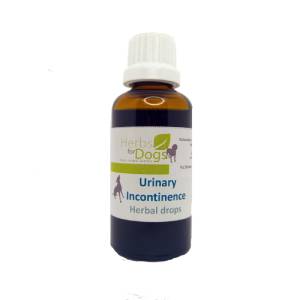Skip to product information


Herbs For Dogs | Urinary Incontinence 50ml
OPTIONS
Default Title
R 193.00
Stock: 0
Qty:
Herbs For Dogs | Urinary Incontinence 50ml
Description: Support your dog's urinary health with our specially formulated herbal tincture. Designed to assist dogs suffering from urinary incontinence, this blend harnesses the natural properties of carefully selected herbs.
Ingredients:
- Rubus: Known for its soothing properties.
- Solidago: Supports urinary tract function.
- Agathosma: Aids in maintaining healthy bladder function.
- Zea Mays: Contributes to urinary health.
- Urtica: Helps reduce inflammation.
- Achillea: Promotes overall urinary system wellness.
- Solvent: 45% alcohol & aqua.
Understanding Incontinence in Dogs:
Incontinence in dogs refers to the involuntary leakage of urine, which can occur at any age but is more common in older dogs. It is not a behavioral issue but rather a medical condition that can stem from various underlying causes.
Types of Incontinence:
- Urge Incontinence: Occurs when a dog feels an urgent need to urinate but cannot reach an appropriate place in time.
- Overflow Incontinence: Happens when the bladder is overly full and leaks urine, often due to an obstruction or neurological issues.
- Functional Incontinence: Results from physical limitations that prevent a dog from reaching an outdoor area or designated spot in time.
- Stress Incontinence: Often seen in spayed female dogs, this type occurs during physical activities like coughing, sneezing, or exercising.
Causes:
- Age, hormonal changes, urinary tract infections, neurological disorders, and anatomical abnormalities can all contribute to incontinence.
Symptoms:
- Unexplained wet spots in bedding or on the floor, frequent urination, accidents in the house, and licking of the genital area.
Management and Treatment:
- Consultation with a veterinarian is essential for diagnosis. Treatment may include medications, dietary adjustments, herbal remedies, or surgical options.
Usage: Administer as directed by your veterinarian. Ideal for dogs experiencing urinary incontinence.